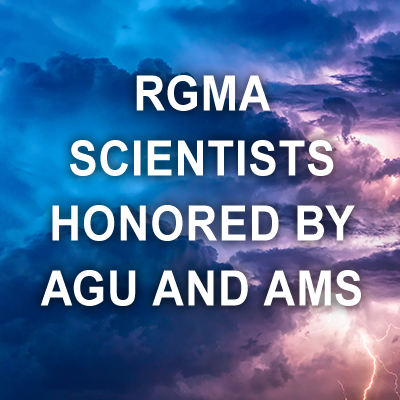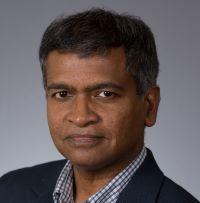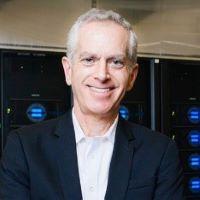RGMA Scientists Honored by AGU and AMS
The annual meetings of the American Geophysical Union (AGU) and American Meteorological Society (AMS) are more than opportunities for researchers to share their science with their peers and make new connections.
Eight researchers with ties to the U.S. Department of Energy’s (DOE) Earth and Environmental Systems Modeling (EESM) Regional & Global Model Analysis (RGMA) program area received or will receive honors at the latest AGU and AMS annual meetings.
2023 AGU Awards
At its December 2023 fall meeting in San Francisco, California, AGU recognized 63 new AGU Fellows. That distinguished group included three EESM researchers: Xiaohong Liu, Suzana J. Camargo, and Adam H. Sobel.
The honor is awarded annually to AGU members who “have made exceptional contributions to Earth and space science through a breakthrough, discovery, or innovation in their field.”
Liu, Texas A&M, was recognized for “exceptional contributions to understanding the fundamental mechanisms of aerosol impacts on clouds and climate and advancing atmospheric models. Liu’s RGMA-funded project “Understanding Cloud Feedback and Climate Sensitivity in E3SMv1 and CMIP6 Models: Roles of Cloud Microphysics and Aerosol-Cloud Interactions” used the Energy Exascale Earth System Model (E3SM) model analysis and applied it to other Coupled Model Intercomparison Project Phase 6 (CMIP6) models to advance the understanding of the large increase in equilibrium climate sensitivity found in the E3SM version 1 when compared to its predecessor, Community Earth System Model version 1.
AGU recognized Camargo, Columbia University, “for outstanding contributions that have advanced our understanding of tropical cyclones and their relation to climate variability and change.”
Sobel, also with Columbia University, received the AGU Fellowship honor for “outstanding contributions to understanding of tropical meteorology and climate.”
Camargo and Sobel, are co-principal investigators for the research project “The Forced Trends in the Tropical Pacific and Global Tropical Cyclones in Earth System Models.” Funded by RGMA, the project seeks to use E3SM to better understand the forced trend in global tropical cyclones and how it is influenced by forced trends in the tropical Pacific sea surface temperature.
Also honored at the fall meeting as a recipient of the John Tyndall History of Global Environmental Change Lecture award was Ramalingam Saravanan. Saravanan, Texas A&M University, was awarded the lectureship in recognition of his “outstanding contributions to our understanding of global environmental change.” Saravanan is a co-principal investigator on the project “Understanding Cloud Feedback and Climate Sensitivity in E3SMv1 and CMIP6 Models: Roles of Cloud Microphysics and Aerosol-Cloud Interactions,” led by Liu and was a principal investigator on a recently completed RGMA-funded project “Assessing the Influence of Background State and Climate Variability on Tropical Cyclones Using Initialized Ensembles and Mesh Refinement in E3SM”.
2024 AMS Awards
Recent AGU Fellow Xiaohong Liu and five other EESM scientists are among the newest group of AMS Fellowship and award recipients that will be honored January 31 during the society’s annual meeting in Baltimore, Maryland.
Liu, William Collins, Yun Qian, and Jonathan H. Jiang are among the 25 individuals who will be recognized as part of the 2024 class of AMS Fellows. AMS Fellowship honors are awarded for “outstanding contributions to the atmospheric or related oceanic or hydrologic sciences or their applications during a substantial period of years.”
Collins, Lawrence Berkeley National Laboratory, is the principal investigator for “Calibrated and Systematic Characterization, Attribution, and Detection of Extremes (CASCADE),” an RGMA-funded project that seeks to advance the nation’s ability to identify and project climate extremes and how they are affected by climate change.
Qian, Pacific Northwest National Laboratory, serves as a task/institutional lead on the “Coastal Observations, Mechanisms, and Predictions Across Systems and Scales – Great Lakes Modeling (COMPASS-GLM)” and “Integrated Coastal Modeling (ICoM)” projects, funded by RGMA, MultiSector Dynamics (MSD), and Earth System Model Development. Qian is a co-principal investigator on the project “A Framework for Improving Analysis and Modeling of Earth System and Intersectoral Dynamics at Regional Scales (HyperFACETS)” funded by both RGMA and MSD.
Jiang, California Institute of Technology, is a participant in the RGMA-funded project “The Role of Deep Convection and Large-scale Circulation in Driving Model Spread in Low Cloud Feedback and Equilibrium Climate Sensitivity.” The project uses DOE’s E3SM and other CMIP6 models to advance the understanding of cloud processes and cloud feedbacks and reduce the uncertainty in climate sensitivity estimates.
Along with the project’s principal investigator, Hui Su of the University of California Los Angeles, Jiang has also been awarded the Banner I. Miller Award for “significant contributions advancing the understanding of rapid intensification of tropical cyclones and paving the way towards the use of machine learning in operational forecasting.”
Richard Seager, Columbia University, is the 2024 recipient of the Jule G. Charney Medal. The medal, which is awarded to individuals who have made highly significant research or development achievement in the atmospheric or hydrologic sciences, was awarded to Seager for “significant and innovative contributions in the attribution of past droughts and floods, and to understanding the impact of rising greenhouse gases on future hydroclimate.” Seager is a co-principal investigator on the RGMA-funded projects “The Role of Vegetation in Past and Future Global Hydroclimatic Change” and “The Forced Trends in the Tropical Pacific and Global Tropical Cyclones in Earth System Models” along with Camargo and Sobel.
Nominate Your Peers
Nominations for AMS 2025 awards and honors will open February 1, 2024. The 2025 AMS Annual Meeting will take place January 12 to 16 in New Orleans, Louisiana.
Nominations for AGU 2024 section awards and union honors are anticipated to open in mid-January. The 2024 AGU Fall Meeting is scheduled for December 9 to 13 in Washington, D.C.










